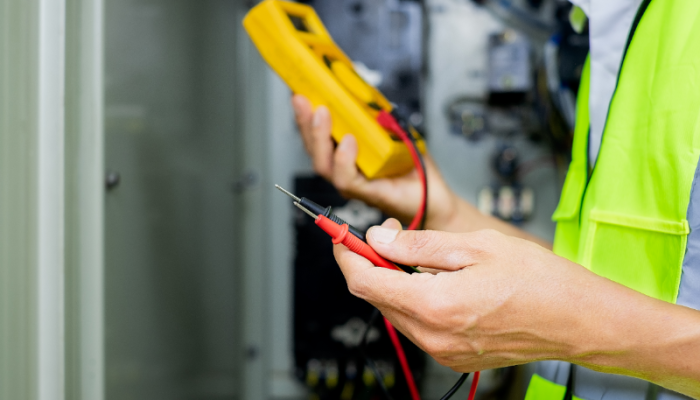Failed Before You Start? Key Electrical Issues That Lead to Inspection Failures

Have you ever worried that your home might fail an electrical inspection? You’re not alone. Many homeowners find themselves facing this nerve-wracking situation, often at important times like during a home sale or after a major renovation or remodel. It’s important to understand the common issues that might cause a failed electrical inspection.
Common Electrical Issues That May Lead To Inspection Failures
Electrical inspections are thorough processes designed to ensure safety and compliance with local building codes. Whether you are a homeowner looking to sell, a potential home buyer or looking to ensure the safety of your family after you’ve renovated – Here are some of the most common issues that can cause your home to fail an electrical inspection:
Outdated Wiring Systems – Homes with outdated wiring systems, such as knob and tube or aluminum wiring, often fail inspections. These systems can be dangerous, posing fire hazards and other safety risks. Upgrading to copper wiring can ensure safety and compliance.
Improper Grounding and Bonding – Grounding and bonding are critical for preventing electrical shocks and fires. Inspectors often find that older homes lack proper grounding systems. Ensuring that your electrical system is correctly grounded and that all components are securely bonded is crucial.
Overloaded Circuits – Each circuit in your home is designed to handle a specific amount of electrical load. Overloaded circuits are a common issue, especially in older homes that haven’t been updated to accommodate modern electrical demands. Upgrading your service panel can provide more circuits and reduce the risk of overloading.
Faulty GFCI Protection – Ground Fault Circuit Interrupters (GFCI) are required in areas with high moisture, such as bathrooms and kitchens. These devices protect you from electrical shock by breaking the circuit when they detect ground faults. Missing or faulty GFCI protection is a significant red flag during inspections.
Lack of AFCI Protection – Arc Fault Circuit Interrupters (AFCI) are designed to prevent electrical fires by shutting off the current when they detect dangerous arc faults in circuits. Homes without adequate AFCI protection often fail inspections, particularly in bedrooms and other living spaces where these devices are now mandated.
Preventing Failures Before They Happen
Electrical Inspections don’t have to be something that you dread. If you’re looking to ensure that your home will pass an electrical inspection, there are some simple and proactive steps you can take:
Hire a Qualified Electrician – Regular check-ups by a licensed electrician can catch many potential issues before they become major problems or cause a failed inspection. This is especially important if you live in an older home or have made significant electrical modifications.
Update Your Home’s Electrical System – Consider a full electrical upgrade if your home still relies on outdated electrical systems. This can be a significant investment but is an important step for both safety and compliance.
Install Necessary Safety Devices – Ensure that all required safety devices, including GFCI and AFCI protection is in place and fully functional. Regular testing and maintenance of these devices can prevent an electrical inspection failure.
Understand Local Electrical Codes – Building codes vary by location. You should familiarize yourself with the specific requirements in your area to avoid any potential surprises during an inspection.
What To Do After A Failed Inspection
If your home fails an electrical inspection, it’s important to take immediate and appropriate actions to ensure safety and compliance. Here are the essential steps to follow:
Review the Inspection Report – Carefully go through the inspection report with a local, licensed electrician to understand all the issues cited. This report will provide details for every problem that has to be addressed and can serve as a checklist for the next steps.
Prioritize Repairs – Some issues may be more important than others, especially those that pose immediate safety risks. Prioritize these repairs to ensure safety and compliance. Your electrician can help you determine which issues to tackle first.
Hire a Qualified Electrician – For the repairs, it’s important to hire a licensed electrician who is familiar with your local codes and standards. DIY fixes are not advisable for most electrical work due to the complexity and safety risks involved.
Schedule a Follow-Up Inspection – Once the necessary repairs are completed, schedule a follow-up inspection to verify that all issues have been properly addressed.
Keep Documentation – Keep records of all repairs and correspondence related to the inspection and follow-up. This documentation can be useful for future reference, especially if you plan to sell the home.
If you need a professional electrical inspection, or are looking for a local electrician that can help address any problems after a failed inspection – call Reyff Electric today. We’ve been providing residential & commercial electrical services to home and business owners for over 40 years throughout Northern California. Contact us today.

